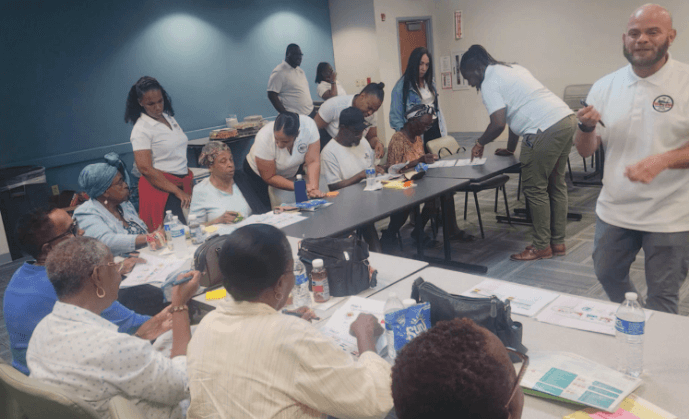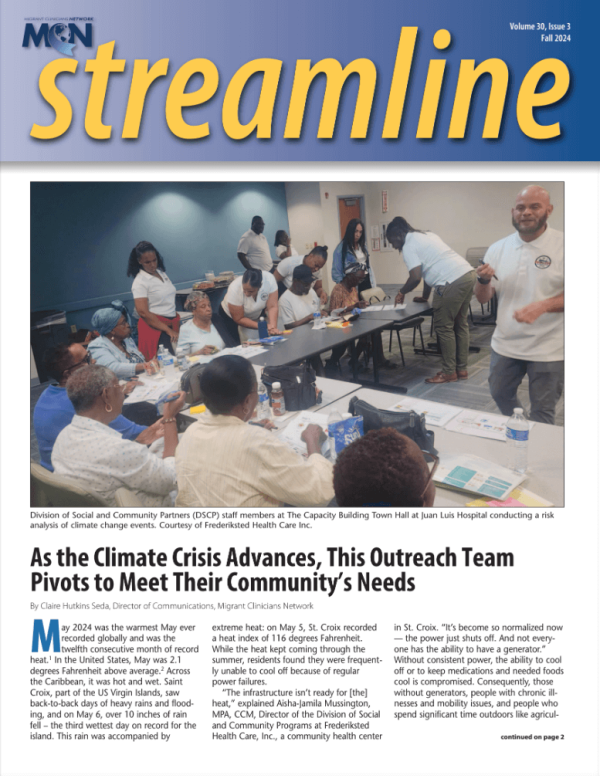
Division of Social and Community Partners (DSCP) staff members at The Capacity Building Town Hall at Juan Luis Hospital conducting a risk analysis of climate change events. Courtesy of Frederiksted Health Care Inc.
May 2024 was the warmest May ever recorded globally and was the twelfth consecutive month of record heat.1 In the United States, May was 2.1 degrees Fahrenheit above average.2 Across the Caribbean, it was hot and wet. Saint Croix, part of the US Virgin Islands, saw back-to-back days of heavy rains and flooding, and on May 6, over 10 inches of rain fell – the third wettest day on record for the island. This rain was accompanied by extreme heat: on May 5, St. Croix recorded a heat index of 116 degrees Fahrenheit. While the heat kept coming through the summer, residents found they were frequently unable to cool off because of regular power failures.
“The infrastructure isn’t ready for [the] heat,” explained Aisha-Jamila Mussington, Director of the Division of Social and Community Programs at Frederiksted Health Care, Inc., a community health center in Saint Croix. “It's become so normalized now -- the power just shuts off. And not everyone has the ability to have a generator.” Without consistent power, the ability to cool off or to keep medications and needed foods cool is compromised. Consequently, those without generators, people with chronic illnesses and mobility issues, and people who spend significant time outdoors like agricultural workers, construction workers, and people without homes are at highest risk of heat-related illnesses. As climate change progresses, outreach teams are pivoting to address the growing health risks associated with climate in their regions, even when it is not what the team had initially set out to do.
Frederiksted Health Care, Inc., with five sites across the island, serves roughly a quarter of the 41,000 residents of Saint Croix. Mussington’s team started off running the health center’s Ryan White HIV/AIDS program, with outreach around prevention, testing, and treatment. “But we have expanded into the medical continuum,” Mussington noted. Their health program for people without houses features a “one-stop shop clinic” every month along with essential support services and case management, showers, clothing, and hot meals. They have a harm reduction program featuring a needle exchange. They also have a partnership with Substance Abuse and Mental Health Services Administration (SAMHSA) to provide education and awareness on mental health.
When Migrant Clinicians Network reached out to the health center to consider a pilot project focused on disaster preparedness with agricultural workers and farmers as the focus, however, Mussington and her team quickly signed up, and found a tremendous need.
“Tools that could help [the agricultural community] deal with climate change, but also better their health outcomes – it’s something that is very new for us, but we see how necessary it is and how the linkage is not too far off from your everyday life,” she said. “We can definitely be impactful for that community.” A recent town hall for the agricultural community, for example, uncovered great concerns about hurricanes, heat, and food scarcity; without this new emphasis on climate disasters, the team would not have known that their community was seeking assistance in those areas.
Their efforts are tailored to the community, both in terms of the community’s needs, and leaning on the community’s strengths. A strong farmer’s market culture and an emphasis on local food – St. Croix’s agriculture is mostly produced to feed the island, and not for export – made Frederiksted’s farm-to-table program an obvious and successful next step. Partnering with a local farm and a local restaurant, the outreach team used a farm-to-table eating experience as an opportunity to help the community see the sobering long-term impact of extreme weather farmers are experiencing on the food they eat.
Partnering with Migrant Clinicians Network through a grant with the US Department of Agriculture’s National Institute of Food and Agriculture, Frederiksted Health Care, Inc. completed a needs assessment, which informed the training that MCN provided in the form of “train the trainers” – meaning MCN provided trainings for Mussington’s team, who then further disseminated the training to individuals involved in agriculture. MCN contributed all the resources and materials for educational community activities and also provided technical assistance along the way, to ensure smooth implementation of the training, and ensured documentation and evaluation throughout the project.
“Climate change is rapidly increasing the health threats faced by agricultural workers and their families. It exacerbates preexisting health conditions and intensifies the social determinants they already struggle with,” said Marysel Pagán Santana, DrPH, Director of Environmental and Occupational Health and Senior Program Manager for Puerto Rico at Migrant Clinicians Network. “Frederiksted Health Care is leading the charge by integrating climate health risks into their outreach programs, demonstrating how health centers can adapt their efforts to address these emerging challenges.”
“Caribbean communities are experiencing daily the effects of this phenomenon,” noted Myrellis Muñiz Marquez, MPH, Puerto Rico Program Manager at Migrant Clinicians Network. “They need to have access to reliable resources and best practices to protect their health and safety. Agricultural communities have a series of vulnerabilities that increase the urgency for these educational interventions.”
While the Caribbean has experienced numerous years of detrimental climate-related disasters, most communities across the United States have also been affected by one or more disaster in recent years, and climate models indicate that few communities will be spared. Frederiksted provides a model for other health centers, demonstrating that approaches need to be developed at the local level to take into account not just the types of disasters the community may experience, but the unique threats, needs, and resources surrounding such a disaster that the agricultural community may have. Climate outreach efforts do not have to start from scratch; like Frederiksted, health centers can augment their pre-existing outreach programs to incorporate climate realities, even if the current outreach programs are unrelated to climate.
Here, the Migrant Clinicians Network team that worked closely with Mussington and the Frederiksted pilot project offers practical actions that health centers can take:
1. Identify and get to know the community you will reach: Even if you believe you know the community, or you consider yourself a part of it, reflect on your perceptions of this group, their environment, and their potential needs. Use this example Empathy Map from GameStorming to guide the reflection: http://bit.ly/3N7vemQ
2. Introduce yourself to the community: Engaging with a community implies planting, cultivating, and nurturing a relationship based on trust and communication. Let them know your intention of listening to their issues, worries, and needs to build on their existing capacities and knowledge with resources and solutions.
3. Create a participatory space to understand their needs: Even when communities are near each other, their perception of climate-related risks vary. Use our Community Risk Assessment, in English and Spanish, to understand vulnerabilities in your community: https://www.migrantclinician.org/resource/community-resource-mapping.html-0. You can use the World Café method: https://theworldcafe.com/tools-store/hosting-tool-kit/
4. Guide them in a conversation to find out and document their strengths, weaknesses, opportunities, and threats with our in English and Spanish: https://www.migrantclinician.org/resource/swot-analysis.html. Document their resources with our Community Resource Mapping page: https://www.migrantclinician.org/resource/organization-materials-resource-mapping-template.html
5. Seek to bridge gaps with workshops, initiatives, technical assistance, and resources. In agricultural communities, some of these activities can be sustainable farming workshops, water conservation programs, integrated pest management (IPM) training, agroforestry projects, health screening fairs, community gardens, and nutrition programs, emergency preparedness training, and farmer support groups. Use our manual Designing Community-based Communication Campaign for ideas, templates, and more: https://www.migrantclinician.org/resource/designing-community-based-communication-campaigns-manual.html
References
1 National Oceanic and Atmospheric Administration. May 2024 was Earth’s warmest May on record. 13 June 2024. https://www.noaa.gov/news/may-2024-was-earths-warmest-may-on-record
2 National Centers for Environmental Information. May 2024 National Climate Report. https://www.ncei.noaa.gov/access/monitoring/monthly-report/national/202405
